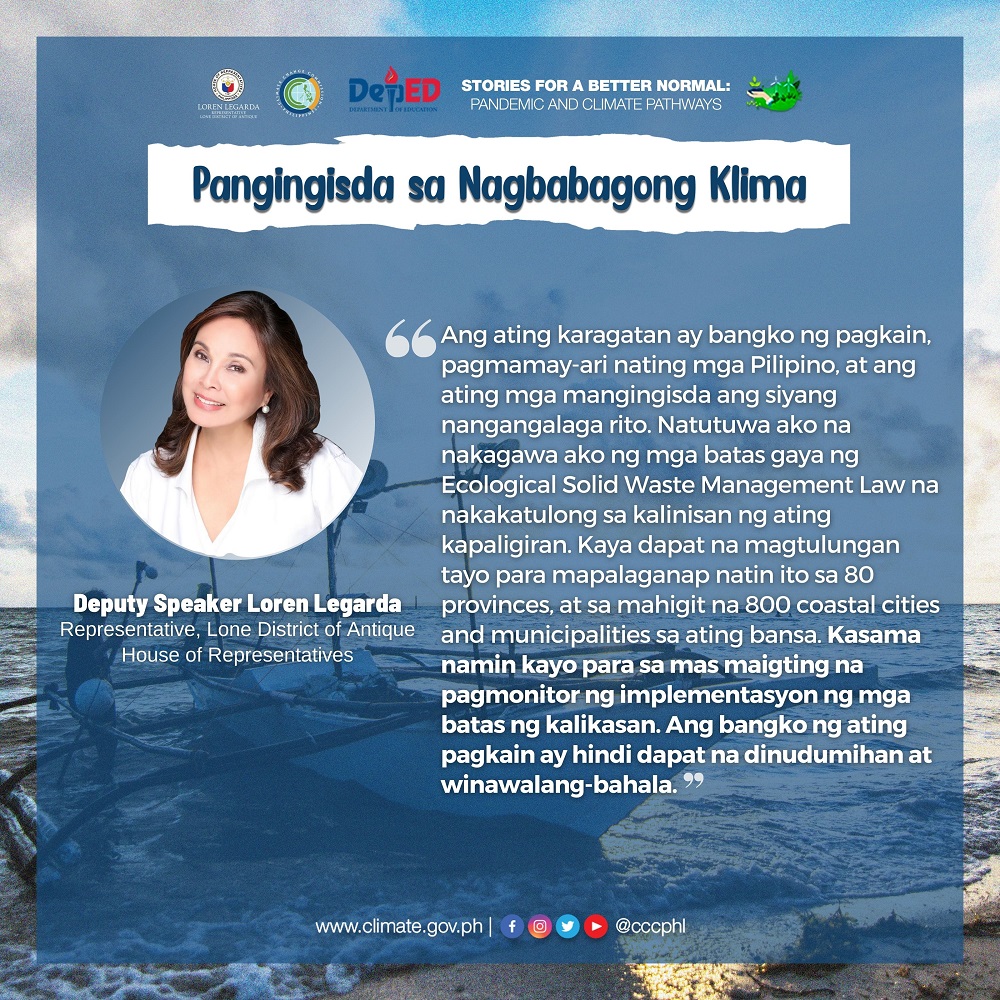
October 11, 2021 Monday

MANILA, 12 October 2021 — The 65th episode of “Stories for a Better Normal: Pandemic and Climate Change Pathways” featured climate change adaptation and resilience practices as well as the protection and restoration efforts of our fisherfolk and advocate groups to support the fisheries sector.
The online conversation conceptualized and hosted by a three-term Senator, now Deputy Speaker and Antique Representative Loren Legarda featured guests including Roberto “Ka Dodoy” Ballon, Chairperson of the Coalition of Municipal Fisherfolk Associations in Zamboanga Sibugay and 2021 Ramon Magsaysay awardee; Ruperto “Ka Uper” Aleroza, National Anti-Poverty Commission Vice Chair for Basic Sectors; and Atty. Rhea Yray-Frossard, Fisheries Management Officer and Coordinator. Climate Change Commissioner Rachel Anne Herrera opened the show and joined as co-host.
“Sa gitna ng lumalalang krisis sa klima o climate emergency, patuloy na pag-init ng mundo, pagtaas ng lebel at pag-init ng tubig-dagat dahil sa pag-absorb ng extra carbon dioxide na nasa hangin, polusyon at plastic wastes, illegal fishing activities, ano na ang kalagayan ng ating karagatan, coral reefs, mangroves, at mga isda? What are the practices related to climate change adaptation na nakatutulong sa pagprotect at pagrestore ng marine ecosystems ang pwede nating gamitin o matututunan mula sa mga komunidad at organisasyon na naging successful na sa pag-implement ng mga ganitong practices? We will discuss ways of protecting and healing our marine environment in order to revive the fisheries sector,” said Commissioner Herrera.
Mr. Ballon shared their story of reviving the dying fishing industry through mangrove restoration and implementing sustainable fishing practices. He recalled that before, mangrove forests have been converted into aquaculture farms As mangrove forests vanished, fishers are catching less amount of fish, which led them into poverty. Eventually, fishers resorted to dynamite fishing, which further led to destruction of their fishing areas.
To restore fish catch and marine habitats, Ballon and others have started to plant mangroves. Today, through the Coalition of Municipal Fisherfolk Associations in Zamboanga Sibugay (Comfas), more fishers and coastal municipalities now understand the importance of a healthy marine ecosystem for sustainable fisheries by replicating their mangrove planting initiatives.
“Mayroon tayong karagatan at iyon po ang ating bangko. Tuwing wala po kaming pera pantustos sa aming pamilya at kabuhayan, nagwi-withdraw po kami sa aming bangko. Ngayon, alam na namin kung paano pangalagaan ang ating napakayaman na bangko na karagatan, na may mangrove, sea corals, at sea grasses. Hindi lang kami nag wi-withdraw, kung hindi nagde-deposit din kami sa pamamagitan ng pagtatanim ng mangroves, hindi pagtatapon ng basura, coastal clean-ups, at hindi pagsira ng karagatan tulad ng illegal fishing,” said Ballon.
Atty. Frossard shared the Oceana’s efforts in helping the fisherfolks and coastal communities adapt to the impacts of climate change through information and education campaigns, and lobbying science-based policies for ocean conservation, fisheries protection, and food security.
“In our problem with climate change, everything is connected, and we need to act now. Ito yung kailangan naming ma-emphasize talaga that in Oceana there’s a sense of urgency in implementing full and effective implementation of our laws in prioritizing the fisherfolks that are most vulnerable with the effects of climate change. Empowering coastal communities amid the pandemic is an opportunity we cannot afford to miss,” said Atty. Frossard.
Mr. Aleroza shared the efforts of the National Anti-Poverty Commission in protecting the rights of the fisherfolk and building their climate resilience, and emphasized the need for the establishment of a department that will facilitate the matters concerning fisheries.
"Kung pag-uusapan ang epekto ng climate change, talagang napakalaki ang impact nito sa ating mga mangingisda. Ang pag-init ng tubig ay nagkakaroon ng coral bleaching o pagputi ng ating bahura. Dahil diyan ay namamatay din yung mga organic na pagkain ng mga isda at lumalayo ang ating mga isda sa iba pang uri ng nabubuhay sa ating katubigan. At dahil din sa init na nararamdaman ng mangingisda habang nasa laot, hindi na kami makatagal. Gustuhin man namin na may mahuli pa, 'pag sobrang mainit na ay kailangan na naming umuwi. Dahil doon, ang epekto naman sa kabuhayan namin ay yung pagbaba ng aming huli at kita," said Aleroza.
Legarda lauded these initiatives and efforts of fisherfolk groups and fisheries advocates, and vows to further help the fisheries sector to thrive amid COVID-19 and climate emergency and achieve sustainable development.
“Ang ating karagatan ay bangko ng pagkain, pagmamay-ari nating mga Pilipino, at ang ating mga mangingisda ang siyang nangangalaga rito. Dapat na magtulungan tayo para mapalaganap natin ang Ecological Solid Waste Management Law sa 80 provinces, at sa mahigit na 800 coastal cities and municipalities sa ating bansa,” said Legarda.
As an online discussion to promote health, environmental consciousness, and climate-adaptive practices, "Stories for a Better Normal" aims to change the mindset of individuals, families, and communities by demonstrating ways in which a ‘better normal’ can be realized within our communities.
This online discussion is organized in partnership between the Office of Deputy Speaker Legarda and the Climate Change Commission, with support from the Department of Education, Philippine Information Agency, Institute for Climate and Sustainable Cities, The Climate Reality Project-Philippines and Mother Earth Foundation.